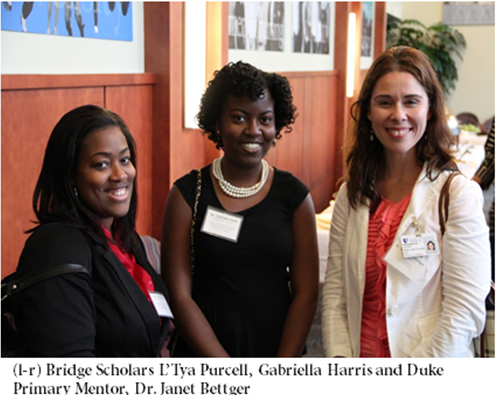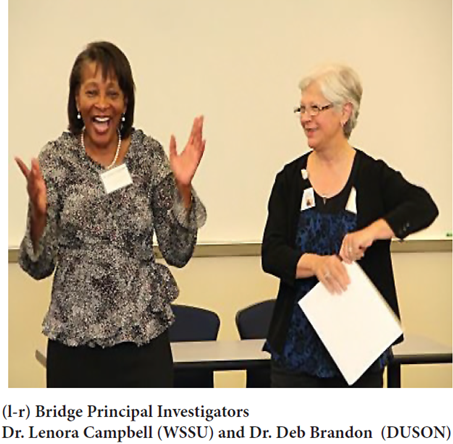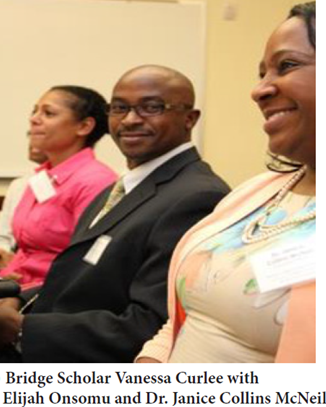Collaboration Leads to Academic Advancement

A key recommendation of the landmark Institute of Medicine report, The Future of Nursing: Leading Change, Advancing Health is that the nation double the number of nurses holding doctoral degrees by 2020. Achieving that goal is crucial to ensuring that there will be enough faculty to prepare the next generation of nurses with the skills, knowledge, and experience needed to pursue science and discovery, and to provide high quality care to a larger population of patients in an increasingly complex, diverse and technology-driven health care system.

Two NCIN grantees in North Carolina, Winston Salem State University Division of Nursing (WSSU) and Duke University School of Nursing (DUSON), are working together to increase the number of PhD prepared nurses through a collaborative five-year partnership funded by the National Institute of General Medicine and the National Institutes of Health, the Nursing Bridge to the Doctorate program. The program allows minority scholars who are working towards their Master’s of Science in Nursing (MSN) at WSSU to seamlessly transition to DUSON’s PhD program once they complete a 17-credit hour Research Honors Track.
Principal investigators, Lenora Campbell, DSN, RN, associate dean and professor at WSSU, and Debra H. Brandon, PhD, RN, CCNS, FAAN, associate professor and director of PhD and post-doctoral programs at DUSON, first conceived of the WSSU-DUSON partnership in 2011 after learning of a similar program between Yale University and Howard University. “Duke and WSSU are both committed to increasing our productivity as research institutions and increasing the number of underrepresented minority nurses at all levels, so partnering on this project seemed to be a natural fit,” said Brandon.

The goal of the partnership is to increase the number of underrepresented minority PhD nurse scientists. As the percentage of the population comprised of underrepresented minority groups increases, ensuring that the proportion of scientists is reflective of the U.S. population, and can provide a diversity of experience and views, is critical to the future of biomedical and behavioral research. Dorothy L. Powell, EdD, RN, FAAN, professor and associate dean for global and community health initiatives at Duke, and co-investigator of the WSSU-DUSON partnership, stresses the need to create a pipeline for underrepresented minorities into PhD programs in nursing and other health-related disciplines.
“We have to realize that we need nurse leaders and scientists in research to respond to problems that affect all of us, but especially to current underrepresented minority groups who will soon be the majority of the United States population,” she said. “We have every confidence that these scholars will be successful.”
Scholars begin their doctoral journey by enrolling at WSSU where they are on the Research Honors Track. While completing the track they begin working closely with primary and secondary DUSON mentors, are expected to write an article for publication and complete an eight-week summer research intensive. They also have access to an array of resources, including tutoring sessions and counseling services, to ensure success during their MSN program and to prepare them for doctoral study at DUSON.

Campbell says that the first cohort of scholars who began classes this summer, understand how unique and special this program is. “They are aware that this program will help them advance in their
careers, and they are excited, enthused and energetic.”
As a four-time NCIN grantee, Campbell also plans to use select NCIN resources with the Nursing Bridge to the Doctorate scholars. “NCIN has a great Pre-Entry program that we can borrow from and we will incorporate aspects of the Leadership Toolkit. Every bit helps to ensure a successful transition,” she said.
During the next five years, WSSU and DUSON expect to graduate a total of 12 PhD scholars. With the abundance of resources offered to scholars, including full tuition and fees for both programs, living stipends, laptops, research supplies and materials, both WSSU and DUSON are confident that they will produce nurse scientists who will advance health care, address health disparities and lead change.

Two NCIN grantees in North Carolina, Winston Salem State University Division of Nursing (WSSU) and Duke University School of Nursing (DUSON), are working together to increase the number of PhD prepared nurses through a collaborative five-year partnership funded by the National Institute of General Medicine and the National Institutes of Health, the Nursing Bridge to the Doctorate program. The program allows minority scholars who are working towards their Master’s of Science in Nursing (MSN) at WSSU to seamlessly transition to DUSON’s PhD program once they complete a 17-credit hour Research Honors Track.
Principal investigators, Lenora Campbell, DSN, RN, associate dean and professor at WSSU, and Debra H. Brandon, PhD, RN, CCNS, FAAN, associate professor and director of PhD and post-doctoral programs at DUSON, first conceived of the WSSU-DUSON partnership in 2011 after learning of a similar program between Yale University and Howard University. “Duke and WSSU are both committed to increasing our productivity as research institutions and increasing the number of underrepresented minority nurses at all levels, so partnering on this project seemed to be a natural fit,” said Brandon.

The goal of the partnership is to increase the number of underrepresented minority PhD nurse scientists. As the percentage of the population comprised of underrepresented minority groups increases, ensuring that the proportion of scientists is reflective of the U.S. population, and can provide a diversity of experience and views, is critical to the future of biomedical and behavioral research. Dorothy L. Powell, EdD, RN, FAAN, professor and associate dean for global and community health initiatives at Duke, and co-investigator of the WSSU-DUSON partnership, stresses the need to create a pipeline for underrepresented minorities into PhD programs in nursing and other health-related disciplines.
“We have to realize that we need nurse leaders and scientists in research to respond to problems that affect all of us, but especially to current underrepresented minority groups who will soon be the majority of the United States population,” she said. “We have every confidence that these scholars will be successful.”
Scholars begin their doctoral journey by enrolling at WSSU where they are on the Research Honors Track. While completing the track they begin working closely with primary and secondary DUSON mentors, are expected to write an article for publication and complete an eight-week summer research intensive. They also have access to an array of resources, including tutoring sessions and counseling services, to ensure success during their MSN program and to prepare them for doctoral study at DUSON.

Campbell says that the first cohort of scholars who began classes this summer, understand how unique and special this program is. “They are aware that this program will help them advance in their
careers, and they are excited, enthused and energetic.”
As a four-time NCIN grantee, Campbell also plans to use select NCIN resources with the Nursing Bridge to the Doctorate scholars. “NCIN has a great Pre-Entry program that we can borrow from and we will incorporate aspects of the Leadership Toolkit. Every bit helps to ensure a successful transition,” she said.
During the next five years, WSSU and DUSON expect to graduate a total of 12 PhD scholars. With the abundance of resources offered to scholars, including full tuition and fees for both programs, living stipends, laptops, research supplies and materials, both WSSU and DUSON are confident that they will produce nurse scientists who will advance health care, address health disparities and lead change.
File Attachment: